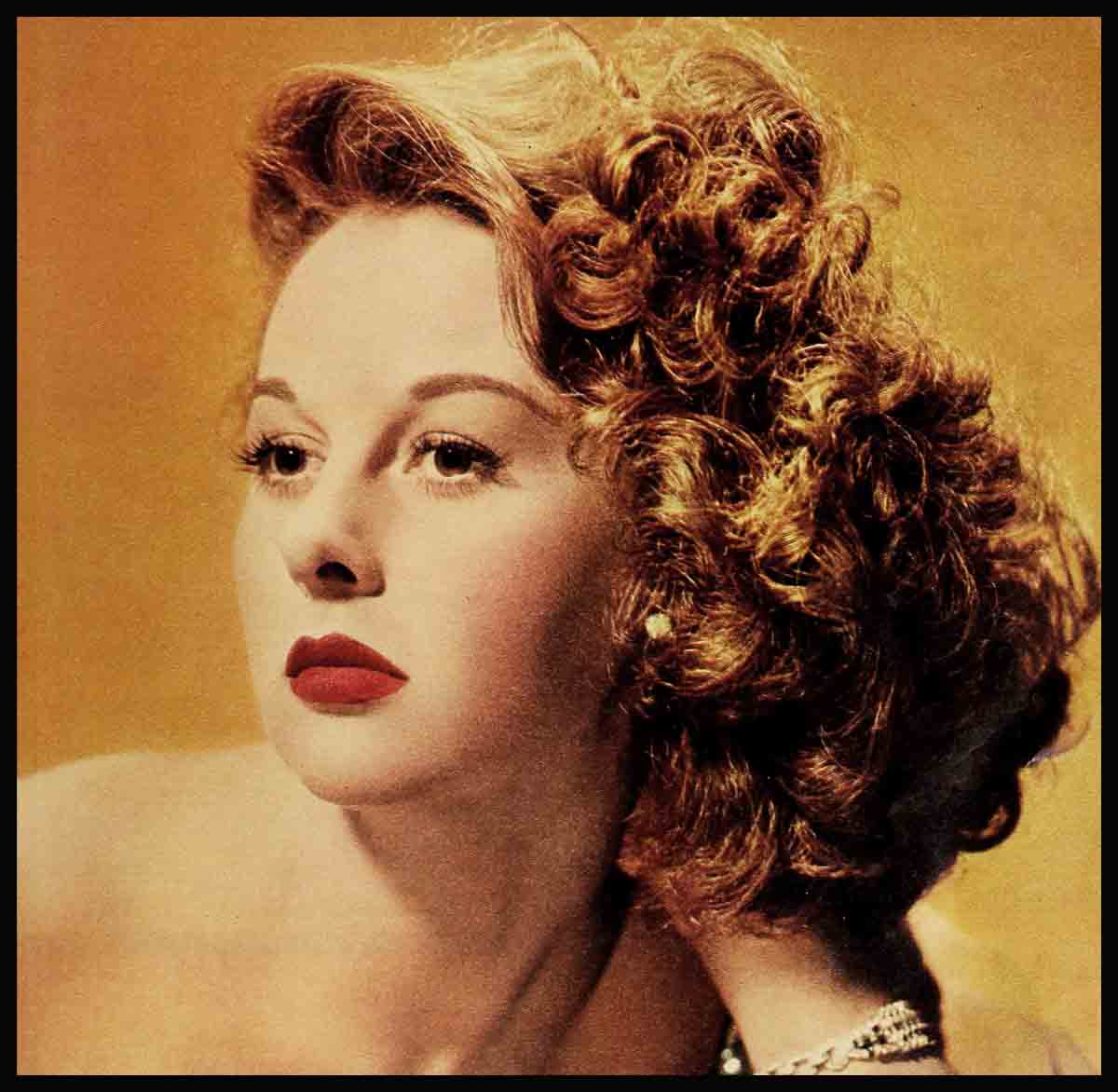
A Simple Case Of Love—Susan Hayward & Jess Barker
In a nation where 8,000,000 married women go to work each day, where, in fact, working wives outnumber unmarried working girls seven to five—no one is shocked because a wife’s earning capacity is larger than her husband’s. This is especially true in Hollywood where career women started getting married long before it was the vogue in other parts of the country, and where professional couples have since evolved various formulas for ways to stay happy though married. Of all these couples, 32-year-old Susan Hayward and her good-looking actor-husband, 36year-old Jess Barker seem to have found an ideal recipe for their special needs.
Susan is under contract to 20th Century-Fox. She has one of those fabulous Hollywood deals you read about in the gossip columns. She earns $5,000 a week every week of the year, whether she works or not, and has a seven year contract with no options.
Jess Barker (as fine an actor as Susan is. an actress) earns $1,000 a week. This is certainly nothing to scoff at, but Jess isn’t under contract to any studio. At one time he was a contract player at Columbia and then Universal, but nowadays he free-lances which means that his income varies. At the moment he is testing for several television shows, and two movie studios are dickering with his agent for term contracts. But chances are that Jess can’t hope to equal Susan’s yearly income, within the immediate future largely because each is in a different. salary bracket.
According to many people this disparity in earning capacity should lead to big trouble. Jess should feel bitter, outraged, inferior. He should resent, at least subconsciously, his wife’s success. Susan, too, should feel cheated, guilty, domineering. After all, she’s the major bread-winner in the family, and doesn’t that weaken her role as a woman?
The chronic prophets of doom have not only predicted divorce for Susan and Jess, but they’re anticipating marital disaster, on the same basis, for Loretta Young and Tom Lewis, Esther Williams and Ben Gage, Anne Baxter and John Hodiak, Virginia Mayo and Michael O’Shea, and all the rest of those professional or non-professional couples whose incomes are unequal in the wife’s favor.
Of course, if you predict divorce for ten or 20 Hollywood couples, you’re likely to be right occasionally. It’s like betting on every horse in a race; you’re bound to come up with the winner. But in the case of Susan Hayward and Jess Barker, which is essentially a case of love, the chances of marriage failure are very small. The Barkers are intelligent people who have faced up to their problems, surmounted the obstacles (although this took a good deal of adjustment) and are now very happily married in a most un-Hollywood way.
“Susan and I,” Jess explains, “regard our marriage as a partnership. Whatever each of us earns goes into the family bankroll. The very nature of the entertainment business is cyclical. Right now Susan is having a great run. Next year or maybe the year after, it’ll be my turn. There’s no point in becoming a neurotic just because your wife is a big success.
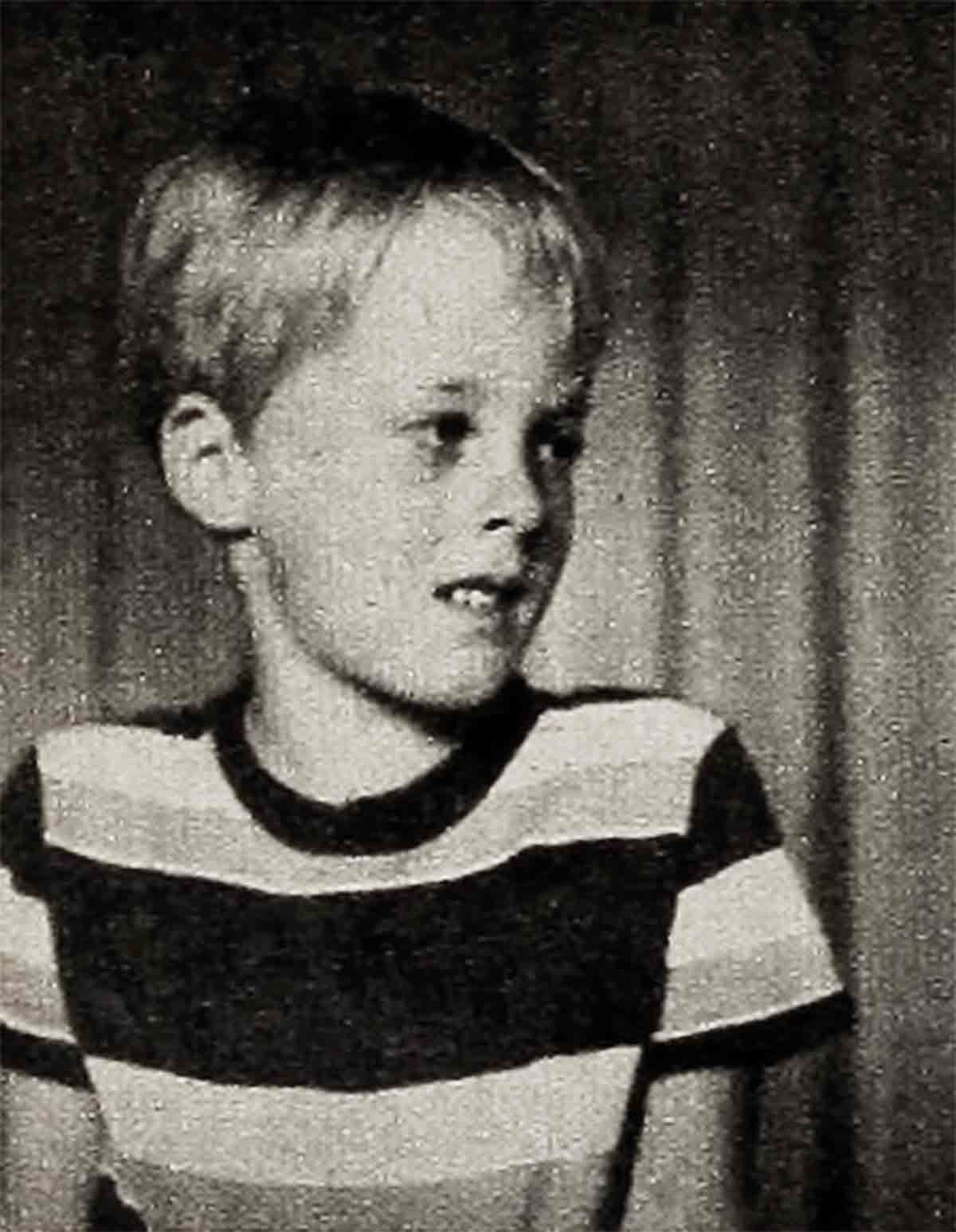
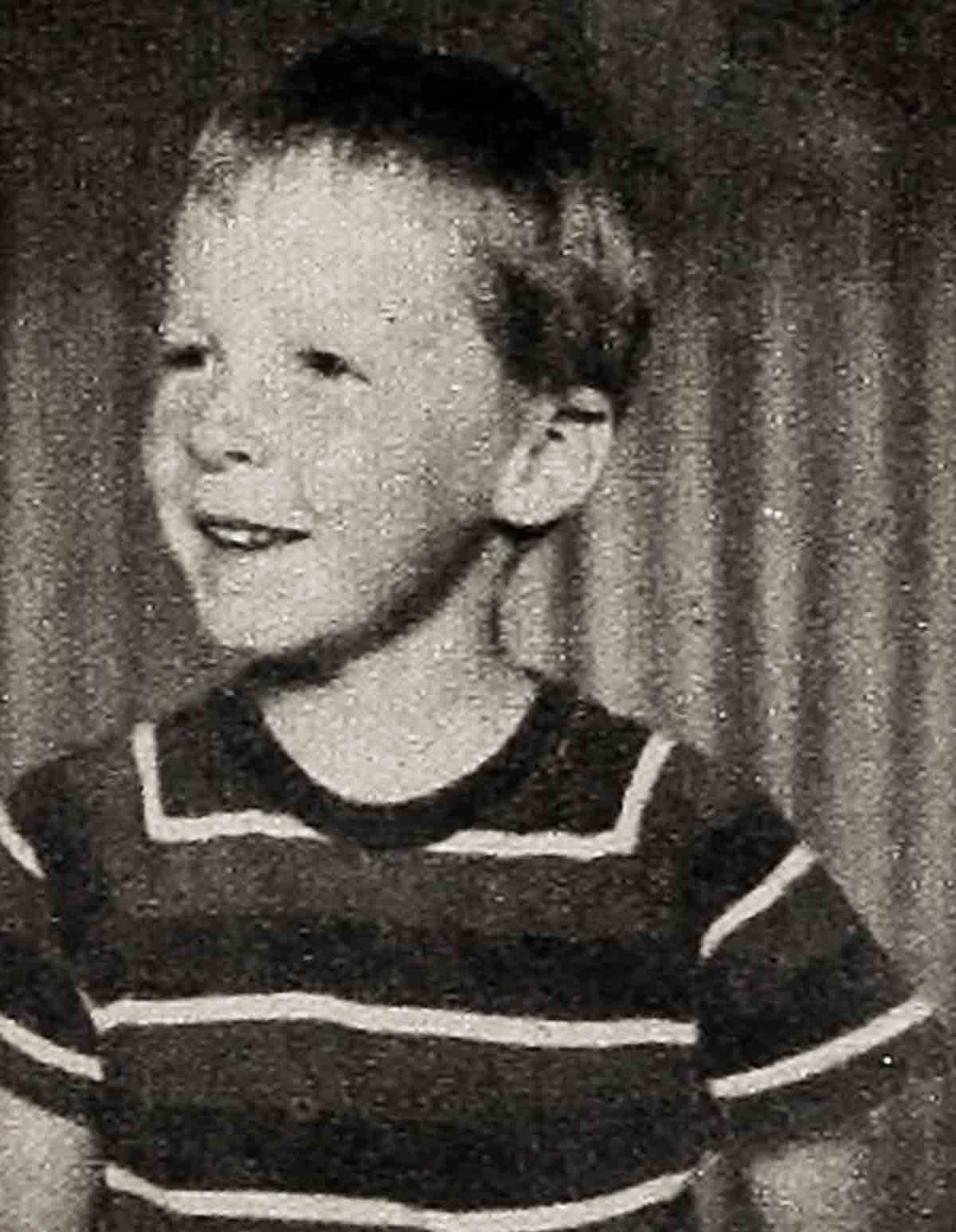
“I admit frankly that when a man isn’t working, especially an actor, it can get on his nerves. He begins to brood, becomes jumpy and irritable. It’s happened to me. But you’ve got to snap out of it. It’s not fair to you, not fair to your wife, and certainly not fair to your children.”
Susan Hayward, who is probably one of the most intelligent actresses in Hollywood, presents her point of view this way: “I’m not competing with Jess for acting laurels or earning money or anything. I’m collaborating with him. Who can properly judge the relative contributions to any collaboration? In a marriage it doesn’t particularly matter if the wife’s monetary contribution is greater than the husband’s, just so long as they both contribute love and understanding and mutual effort.”
It’s well known in Hollywood that when Susan is away on location and Jess is at home, he looks after their seven-year-old twins, Timothy and Gregory—when he isn’t working.
A year ago when Susan was in Georgia for I’d Climb The Highest Mountain, Jess phoned her one evening and said that their housekeeper had quit. “What am I going to do?” he asked. “Who’s going to prepare food for the twins?”
Susan promptly dictated a detailed list of instructions on the care and feeding of twins. She also gave Jess a few recipes and suggested that he buy some supplies, and try to cook dinner himself.
A pretty resourceful guy, Jess did exactly that, and when Susan phoned from location each day thereafter to find out how he was doing, Jess assured her that as an amateur cook he wasn’t half-bad.
What was even more important, he showed no resentment at bearing his share of the family domestic load.
In Hollywood this is pretty unusual. It calls for maturity, honesty, and the frank acknowledgement of realities. There are dozens of actor husbands who would sooner be caught dead than be seen wheeling a carriage, or shopping at the supermarket. These fathers see their children for a few hours on weekends, kiss them goodnight on weekdays, and consider their responsibilities ended.
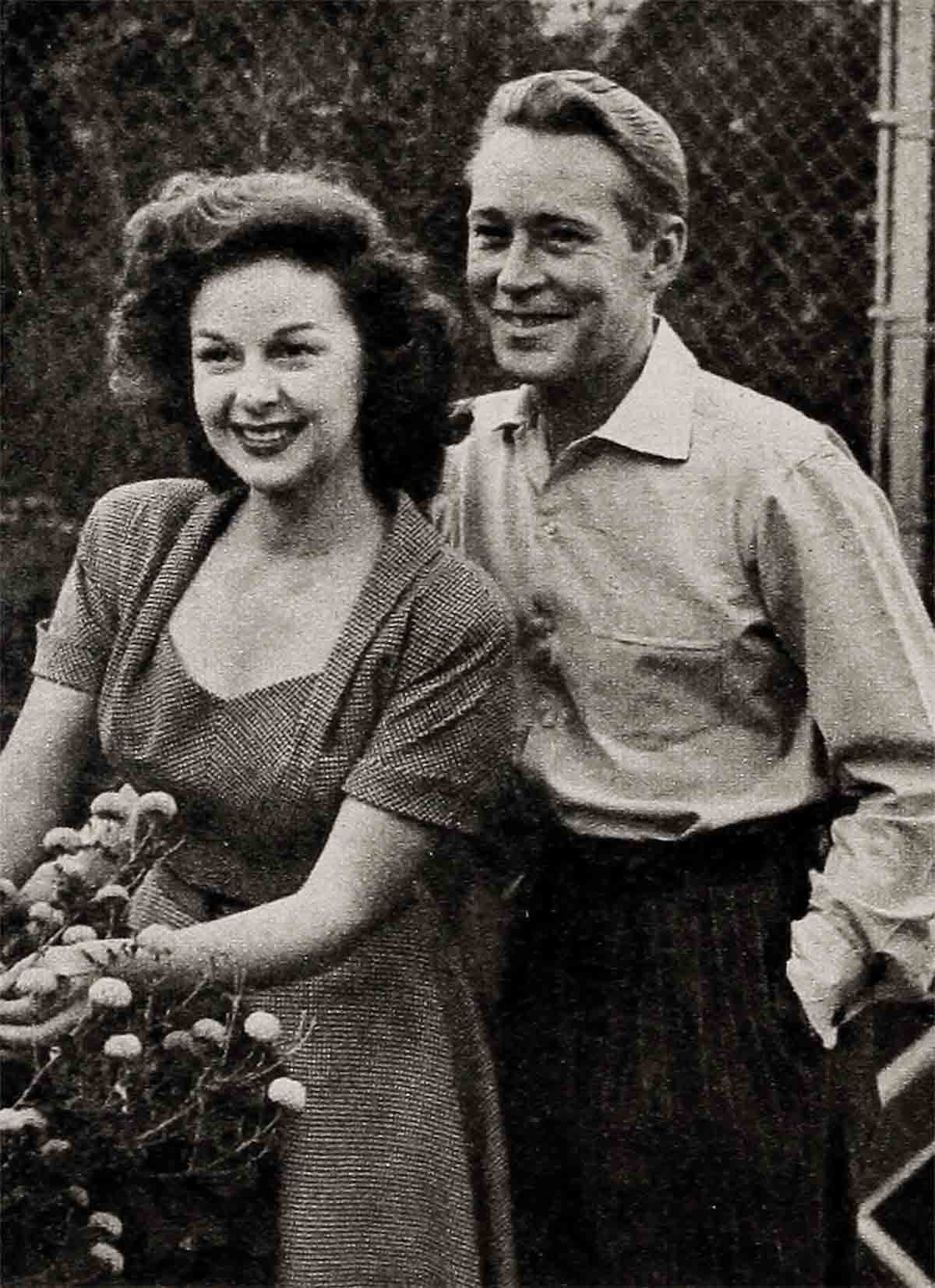
Jess Barker is different. In the past few years, he has probably spent even more time with Tim and Gregory than Susan has, because when Susan is working, she leaves the house at six or seven in the morning and doesn’t return until seven-thirty at night when the boys are ready for bed.
Thus, while Susan is contributing money to the family collaboration, Jess is contributing love and affection to his sons. When Jess is working, Susan tries to arrange her schedule so that she can devote ample attention to the boys.
Efficient and workable as their marriage is today, there was a time when things weren’t running so smoothly.
About four years ago, Susan and Jess were squabbling incessantly, “about little things, minor peeves, quarrels which festered and ran on for three or four days.”
This happens in many marriages and unless the quarrels are seen in true perspective, they frequently develop into major troubles.
Well, four years ago, Susan and Jess had many career problems. Susan was under contract to Walter Wanger at the time, and he was ready to sell her contract to a major studio. Jess, who’d been with Universal, failed to have his option lifted. Optimism in the Barker household was at a low ebb during this period. Had two less intelligent persons been involved, the affair would have resolved itself in a divorce court. But Susan and Jess took their troubles to a marriage counselor.
What he told them in essence was this: “You’re both in the same profession. Economically, you have the same background. You were poor in your youth, ambitious, eager to get ahead. Whether you know it or not, you’re competing against each other. Jess is the man of the house. He feels he should be the dominant wage-earner. Susan is a fine actress. She feels she should exploit her talents.
“Your quarrels probably stem from these frustrations, but a marriage can’t last if the husband and wife compete against each other. You’ve got to compromise and collaborate. And most important of all, quarrels should be settled before you go to bed. Never carry an argument over into the following day.”
Susan admits that she and Jess still argue about things. “But every night we kiss before we go to bed, and in the morning there are never any hard feelings.”
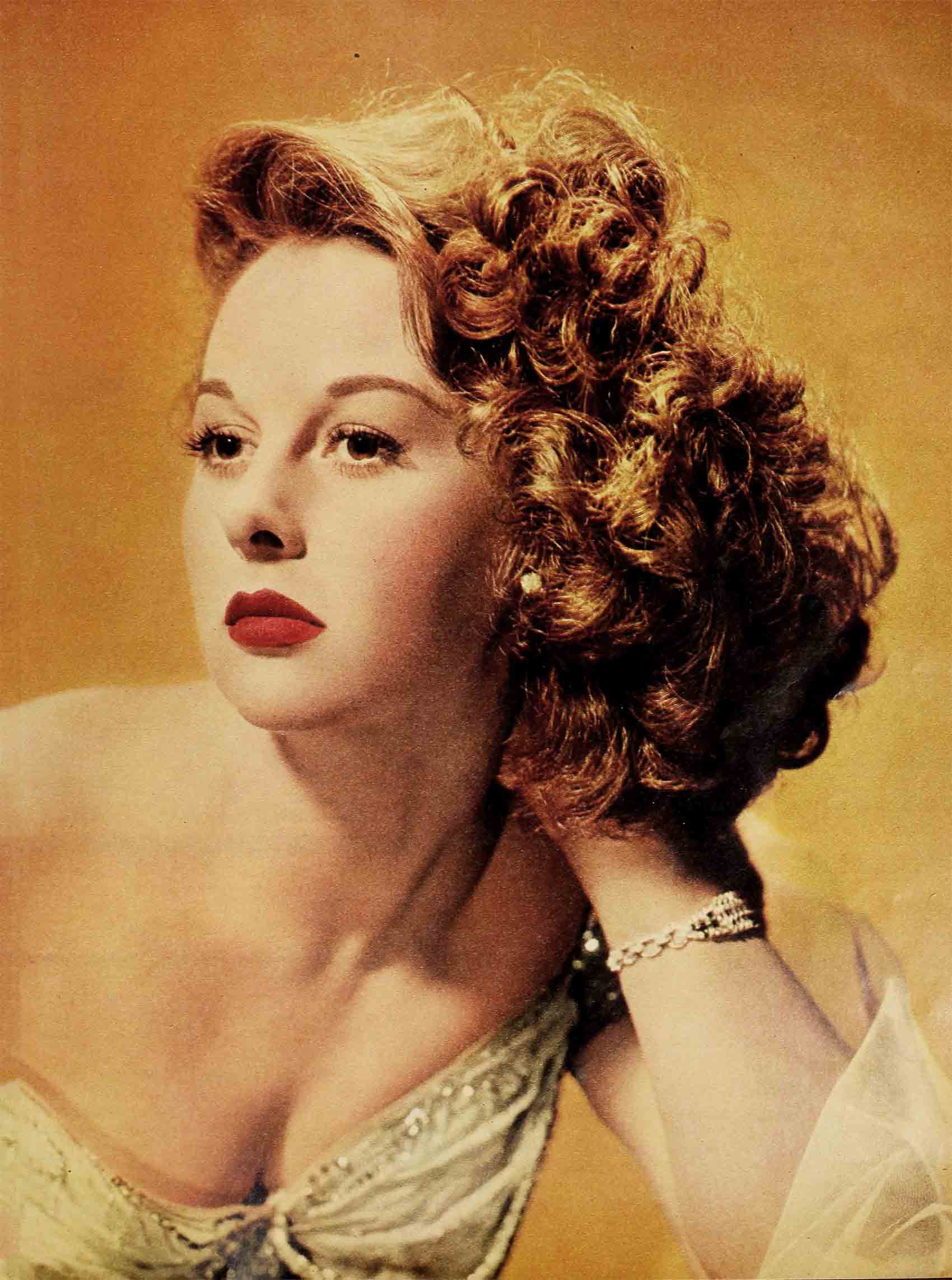
This intellectual approach to marital difficulties is characteristic of Susan Hayward’s entire approach to life. Seek out the best advice and then without any delay follow it through with determination.
Her history bears that out.
She was born Edythe Marrener in Brooklyn on June 30, 1919. Her father was a wireman for the Interborough Rapid Transit Company.
As a little girl, her life was harsh. There was never enough money for little luxuries, and when she was graduated from Girls’ Commercial High School, she had to get a job. “I wasn’t trained for anything,” she recalls, “but I had to earn some money, so I got a job as a model.”
Just about this time, David Selznick was beating the bushes for an unknown actress to play the part of Scarlett O’Hara in Gone With The Wind. One of his directors, George Cukor, happened to pick up an issue of The Saturday Evening Post in which he saw a fetching picture of the hazel-eyed redhead.
Susan was tested for the role first in New York and then in Hollywood. After three weeks in Hollywood at $50 a week, she was told that she wasn’t “right for the part.”
Instead of returning to Brooklyn, Susan moved into a cheap bungalow with her sister. “I was determined,” she says, “to get a job in pictures.”
The job wasn’t very long in coming. One afternoon, Susan rented a bike, lost control of it, and wound up in a prone position on the lawn of an agent named Benny Medford. Benny says, “I took one look at her, and I knew she belonged in the movies. I took her out to Warners, and they signed her at $50 a week, but they dropped her after six months. I was sure she had what it takes, and so was she, so we went over to Paramount. She sang a song or two for the boys and they gave her a contract at $250 a week.”
At this point, Susan was bent on becoming a great dramatic actress. However, Paramount never realized how good she was. They put her in a series of minor B’s and then sent her around the country to exploit other Paramount pictures. She did this for years. Her salary kept mounting, but she couldn’t get any good parts.
Finally, Susan decided to strike a blow for Susan. When the Paramount film salesmen came out to Hollywood for their annual convention, she and every other actress on the lot were introduced to the men by studio vice-president Y. Frank Freeman. The other actresses merely nodded, uttered an idle pleasantry and left the stage. But not Hayward. She made a speech. “Most of you gentlemen,” she said, “know me already. I’ve met many of you on tours in your home towns and it’s good to see you again. In the past you’ve been kind enough to ask why you haven’t seen me in any pictures. There’s one man here who can answer that question. Mr. Freeman, will you please tell these gentlemen why I’m not in any pictures?”
Y. Frank Freeman wasn’t studio vice-president for nothing. “Don’t worry, my girl,” he said. “You’ll soon be in plenty of pictures. We have big plans for you.”
Susan was given a top role in Reap The Wild Wind and then loaned to Columbia to star with Ingrid Bergman and Warner Baxter in Adam Had Four Sons. In each of these films, her acting was superb, and Edythe Marrener was on her way.
Orz night in 1944, when Susan was working at the Hollywood Canteen, a tall, very handsome young actor, who was emceeing the entertainment, came over and introduced himself. He was Jess Barker, and as soon as she heard the name, Susan quickly realized that this was the fellow over at Columbia who was being called the hottest young actor in Hollywood. The fellow who’d played opposite the great ladies of the stage, in New York, and was now scheduled for a featured part in Cover Girl, with Rita Hayworth.
That night Jess asked Susan if he might take her home.
That would be very nice, Susan thought.
Jess took her home—she was living with her mother at the time—but when he tried to give her a goodnight kiss, she hauled off and let him have a beautiful right-hand slap in the face.
Barker was stunned and Susan was insulted. She rushed into the house and slammed the door before he could apologize.
Barker couldn’t figure it out. Here was an actress who’d been working in Hollywood for years, an experienced young woman who’d been around. What sort of reaction was that?
During the next week, he phoned three times. Susan refused to come to the phone. However, she made it a point to turn up again at the Canteen and run into Jess.
She has subsequently admitted that “in the game of love, the gals are always the pursuers and the men the pursued.”
“Every woman,” she says, “when she first sees her Prince Charming, tries to find out how she can meet him again—accidentally. But she isn’t satisfied unless her pursuit causes his pursuit. Of course, after you’re married, you’re dead certain that it was your husband who did the pursuing. I guess that particular feeling is a woman’s face-saving device.
“Actually Jess and I broke our engagement twice in six months before we decided we were absolutely right for each other.”
Whatever the Hayward tactics, they worked. In 1944, Jess took Susan as his wife.
During the early years of their marriage, both of the Barkers’ careers were on the upswing. Susan left Paramount and was immediately signed by Walter Wanger who started to give her some fine pictures. And Jess was working out at Universal. They were both earning a lot of money, and the future looked good. There was no problem of the wife’s overshadowing her husband.
That problem came into being when 20th Century-Fox bought up Susan’s contract from Wanger and set about making her one of the really top-flight dramatic actresses in the business.
That’s when people began sympathizing with Jess and predicting that his ego would be unable to stand the strain of his wife’s success.
They were right for a short period of time—until Susan and Jess with a marriage counselor’s aid, worked out their own design for happy living.
Today, despite the fact that Susan has starred in five successive hits—Rawhide, I’d Climb The Highest Mountain, I Can Get It For You Wholesale, David And Bathsheba, and With A Song In My Heart—the Jess Barkers are easily one of the happiest, most well-adjusted couples in Hollywood.
Susan realizes that because of her success, it is sometimes almost impossible for Jess to get a job. Only recently, Barker was up for a big part at a major studio. “What do you need a job for?” the casting director asked him. “Your wife’s making plenty of money.”
That’s a pretty typical attitude in Hollywood, and it is a most trying obstacle to surmount. Barker is a man with lots of talent and courage. He can’t go to a casting director and say, “Sure, my wife’s making a lot of money, but suppose she stops after three or four years? What happens then? Today with taxes, not very much is left. I have to work, just because my wife is working, too, doesn’t mean I should retire.”
But Jess says none of this, and he never mentions to Susan the problems which beset the actor-husband of a successful actress-wife. He keeps them’ to himself, makes the rounds of the studios, takes whatever parts, large and small, that are offered to him and hopes one day that a lucky break and a lot of honest effort will land him on stardom’s top rung.
Until that day arrives, he and Susan have no intention of endangering what is now one of the most solid marriages in town.
THE END
—BY ARTHUR L. CHARLES
It is a quote. MODERN SCREEN MAGAZINE MAY 1952




